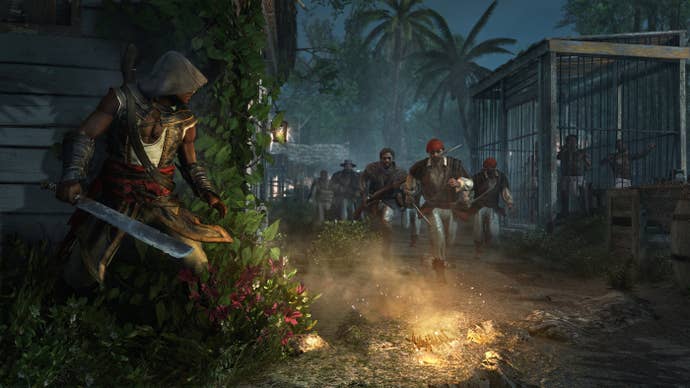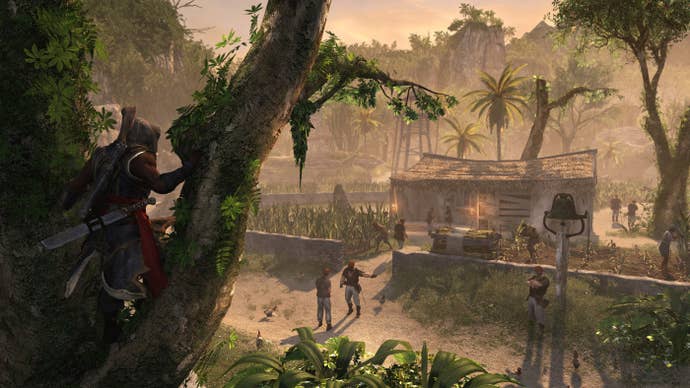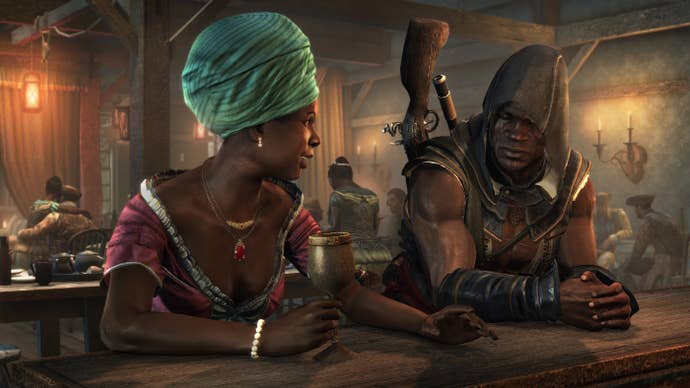Assassin's Creed IV Freedom Cry: DLC That Digs Deeper
Mike takes a look at Assassin's Creed IV's downloadable campaign, Freedom Cry. Does it stand up to the main game?
This article first appeared on USgamer, a partner publication of VG247. Some content, such as this article, has been migrated to VG247 for posterity after USgamer's closure - but it has not been edited or further vetted by the VG247 team.
My aspiration for the Assassin's Creed series is to be action games that speak to something deeper about the era they inhabit. While the first Assassin's Creed kicked off the age-old war between the Assassins and the Templars, the conflict in that game was more nuanced. Instead of a straight good vs. evil divide, Assassin's Creed was about freedom against order. Some of the Templars had understandable motivations: order can provide safety and unmitigated freedom can lead to poor outcomes. What is freedom worth if you're dead or dying, they asked? It's a good question, one that has great relevance with the recent NSA spying scandal.
Assassin's Creed II and its sequels refined and revamped the mechanics found in the first game, but their story was more straightforward. The Borgias were just evil - almost cartoonishly so if you didn't know about their real-life actions - and the larger story was one of revenge. Assassin's Creed III had brief moments of greater depth, like General Washington's betrayal and the juxtaposition of seeking freedom with exterminating Native Americans and the concept of slavery, but the story never had room to really explore those ideas as it ran headlong into its Assassin vs. Templar ending.
Assassin's Creed IV briefly touched on the original's themes of order vs. freedom, particularly in Edward's interactions with Benjamin Hornigold. Again, these ideas are brought up and discarded quickly in the race towards the game's MacGuffin, which is a close analog to the controversial NSA programs. Edward himself spends most of the game as a pirate, not a assassin with a strong moral compass. It's part of why he's so magnetic, but it leads to some frustration when he turns away from heroic convictions time and time again.

The long preamble is meant to show that Assassin's Creed IV: Freedom Cry is reaching back towards the franchise's beginning. Former supporting character Adewale takes center stage in this downloadable content. In Black Flag, Adewale tried to stand as the moral center for Edward, but ultimately gave up his place as Jackdaw quartermaster and confidant to become an assassin. Freedom Cry takes place 15 years after the end of Black Flag, with full-fledged assassin Adewale captaining his own ship. After a successful mission to steal a Templar package on the high seas, Adewale finds himself shipwrecked on French Caribbean colony Saint-Domingue, more specifically the growing city of Port-Au-Prince.
Assassin's Creed IV: Freedom Cry is about slavery. From the story down to its gameplay mechanics, Freedom Cry breathes in the reality of its setting: the slaves in Saint Dominigue outnumbered their masters and other freed people of color ten to one. It is here that former slave Adewale decides to put his new assassin abilities to use to help his people and the local resistance movement, the Maroon.
Digging into the mechanics first, the game still plays largely like Black Flag. The open sea certainly isn't as large, but once you get a new ship, you can sail around to your hearts content, attack ships, harpoon sea life, and deep-sea dive. Port-Au-Prince and other surrounding cities and plantations in Saint Domingue look about the same as similar locations in Black Flag.
The biggest changes are the new systems grafted onto the game. In Black Flag, Edward could recruit pirates in randomly-generated encounters. In Freedom Cry, the number of randomly-generated events has grown and all of them involve saving slaves. Some events always occur in the same areas: saving slaves from hard punishment, stealing an overseer's key to free slaves from cages, or liberating slaves from live auctions. Roaming events include saving escaping slaves from their masters before they're shot and killed or liberating transport convoys of slaves moving through the city. There's also the new Overseers: after freeing slaves, these guys will be out looking for you and will call over other guards if they see you.

The plantations return from Black Flag, but with a new twist that increases the difficulty a fair bit. If you're seen while trying to liberate a plantation, the guards in the area will ignore you and begin killing the slaves you're there to save. While in Black Flag, being spotted was easily fixed with by running or using smoke bomb, but it leads to lost slaves here. I felt bad every time I rushed and got some of the slaves I was there to save killed.
Adewale's progression is tied to the number slaves you save and recruit to the Maroon cause. Additional weapons and perks for Adewale and his ship, the Experto Crede, will be unlocked as you reach certain milestones, so it behooves you to free more of your people. Adewale and Experto Crede upgrade aren't as plentiful as Edward's options, but they're enough for the length of this campaign.
The random events are ever-present and tuned occur frequently, but I think that's intentional on Ubisoft's part. That's the reality of the city at that time. Slavery was everywhere. Especially with Adewale's status as a former slave, it should be shoved in the player's face. It should be something you see everywhere, because it's something Adewale would see everywhere. 'This is how certain people treated other people in the past. Look at their actions. What kind of system leads to this?' Freedom Cry asks.
I much prefer Adewale as a protagonist to Edward, thought I liked Edward during Black Flag. Adewale is a strong, intelligent character with deep convictions and a sense of duty. In the DLC's tale, he's torn between his duty as an assassin and his desire to help the slaves. Freedom Cry also benefits from the short campaign, allowing the writers to focus solely on Adewale and his conflict, instead of having to juggle a number of characters based on historic figures. In the past, that's sometimes led to a theme park feel for the game. 'Look, here's Connor at the signing of the Declaration of Independence!' or 'Edward was friends with Blackbeard!' come to mind.

Adewale's journey in Freedom Cry brings some of the grey morality back to the series, even if that nuance isn't found in the enemies he fights. Instead, the conflict is emotional, between Adewale and brothel madame Bastienne. While Adewale calls for direct action and the immediate strengthening of the Maroon rebellion, Bastienne advocates for a slower path without uptuning the current status quo. Over the course of the short campaign, both characters are proven right and wrong, because there is no easy answer. Though Adewale succeeds in his quest, Freedom Cry takes place in the 1730s, almost 60 years before the actual Haitian Revolution in the region. Adewale may be a hero, but he isn't always right, and it's something I prefer the Assassin's Creed series to explore with the entirety of history at its disposal.
Assassin's Creed IV: Freedom Cry is worthy follow-up to Black Flag, and I feel it puts that game to shame in some respects. Adewale isn't the selfish Edward or the stoic Connor; he stands as a more heroic and driven protagonist. Even then, the game is careful to show that doing the right thing doesn't always have the best outcome. It's a fine line that some previous AC games lost, and I'm hoping it's a bigger part of the series moving forward. At worst, I hope Ubisoft continues to use its DLC offerings to explore concepts that may not want to touch in the main game.
ConclusionIf you've finished Black Flag and are hurting for more action, Freedom Cry is worthy purchase. It's a short story campaign featuring the heroic and duty-driven Adewale. Freedom Cry adds a new new wrinkles to AC4's gameplay, but the real strength is the focus on slavery and the return of some nuance to the world of Assassin's Creed.

